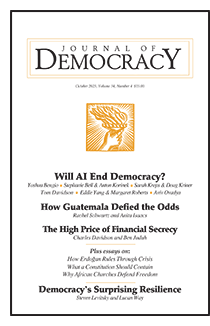Democracy’s Surprising Resilience
Despite worry of an authoritarian resurgence, the vast majority of “third wave” democracies are enduring. Democracy, buoyed by economic growth and urbanization, is outperforming most people’s expectations or fears.

Volume 34, Issue 4
Despite worry of an authoritarian resurgence, the vast majority of “third wave” democracies are enduring. Democracy, buoyed by economic growth and urbanization, is outperforming most people’s expectations or fears.
Almost no one expected a little-known candidate to defeat the ruling antidemocratic regime at the ballot box. But the Guatemalan opposition, backed by the international community, exploited the criminal oligarchy’s fissures to halt the country’s authoritarian slide.
Is politics an arena without rules? No, and, increasingly, many are enshrined in constitutions. But countries that hardwire their political process into their founding charters face other risks.
When Africa’s leaders act undemocratically, they face an unexpected opponent—the power of the pulpit. Within civil society, church leaders and their faithful have become leading defenders of liberal democracy.
Theocratic democracy, the de facto grand bargain between religious groups and political leaders, offers key insights into the relationship between faith, freedom, and the global democratic recession.
Turkey’s economic and political crises have only worsened, but the autocratic president remains in power. His secret? He uses the levers of the state to shield his supporters from harm, while punishing the rest.

An expansive underworld of hidden wealth lies beneath the everyday economy. This stealth network of tax havens, secret trusts, and offshore accounts is weakening democratic institutions and fueling our worst enemies.
In this symposium, the Journal of Democracy brings together leading thinkers, experts, and technologists to explore the challenges that artificial intelligence poses for humanity, and how democratic institutions can be marshaled to help meet those challenges.

AI with superhuman abilities could emerge within the next few years, and there is currently no guarantee that we will be able to control them. We must act now to protect democracy, human rights, and our very existence.

Generative AI can flood the media, internet, and even personal correspondence with misinformation—sowing confusion for voters and government officials alike. If we fail to act, mounting mistrust will polarize our societies and tear at our institutions.
Science fiction may soon become reality with the advent of AI systems that can independently pursue their own objectives. Guardrails are needed now to save us from the worst outcomes.
AI is destined to become another stage for geopolitical conflict. In this contest, autocracies have the advantage, as they vacuum up valuable data from democracies, while democracies inevitably incorporate data tainted by repression.
AI will transform work and entire economies. The potential benefits also bring a dire risk of rising inequality and job losses. But the worst outcomes can still be avoided.
Advances in AI are rapidly disrupting the foundations of democracy and the international order. We must reinvent our democratic infrastructure to ensure our ability to govern in a dramatically different technological world.
A review of Beijing Rules: How China Weaponized Its Economy to Confront the World, by Bethany Allen.
A final statement by Russian activist and opposition politician Alexei Navalny; The North Atlantic Council’s communiqué on Ukraine; Legal analyst Ethan Hee-Seok’s testimony on North Korean asylum-seekers at the China–North Korea border; “Voices of a New Belarus” by playwright Andrei Kureichik; Guatemalan president-elect Bernardo Arévalo’s victory speech.